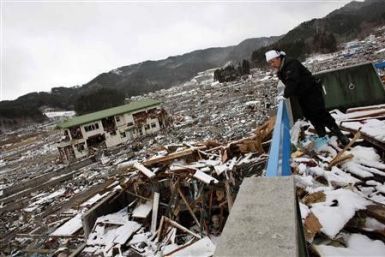U.S. stock index futures rose on Friday, led by energy and material stocks, as optimism about increased economic demand pushed commodity prices higher.
U.S. stocks posted modest losses Thursday after another major earthquake rattled Japan's northeastern coast, but retailers climbed following surprisingly strong March sales.
In a new turn of events, the current week saw some of the biggest political, economic and social changes in recent times.
Almost a month after the massive 9.0 magnitude earthquake and subsequent tsunami hit Japan, a second earthquake struck the north-eastern coast of the country on Thursday.
A giant island of earthquake-tsunami debris is floating in the sea and will hit the Hawaiian islands in the months to come, researchers have said, according to CNN.
U.S. stocks ended lower on Thursday after a major aftershock in Japan triggered new fears about a nuclear crisis, but better-than-expected jobless claims data and monthly retail sales data held losses in check.
Stock index futures pointed to a higher open on Wall Street on Friday, with futures for the S&P 500, the Dow Jones and the Nasdaq 100 up 0.3-0.4 percent.
U.S. stocks ended lower on Thursday after a major aftershock in Japan triggered new fears about a nuclear crisis, but better-than-expected jobless claims data and monthly retail sales data held losses in check.
U.S. stocks declined on Thursday after reports of another earthquake hitting Japan in less than a month, but markets were off their lows after a tsunami warning was lifted.
Although the social media has not yet exploded with the pictures and videos of the latest earthquake in Japan, a home footage of the April 7 quake has hit YouTube.
Oil climbed to its highest level in 2- years on Friday as supply cuts stemming from attacks on Libyan oil fields offset demand concerns spurred by a major aftershock in Japan.
Radiation levels inside the Onagawa nuclear plant in the Miyagi prefecture, north-east of Japan, rose slightly as water spilled out of spent fuel pools after a strong 7.1-magnitude aftershock hit the region on Thursday night. But the company that runs the plant said there was no rise in radiation levels outside the plant.
In what would have been a scary repetition of the tragedy that unfolded after the quake-tsunami last month, two out of three power lines to Japan's Onagawa nuclear plant were knocked out in the fresh aftershock that occurred in Japan's north-east on Thursday night.
A 7.4-magnitude earthquake hit Japan at 11:32 p.m. local time on Thursday in the same area as the initial March 11 9.0-magnitude earthquake killing two people and injuring more than 100in the northeastern Japan.
The IAEA confirms that an earthquake occurred in Japan at 14:32 UTC 7 April. The IAEA International Seismic Safety Centre has rated it as a 7.1 magnitude, revised from an initial 7.4 magnitude. The epicenter of the earthquake was 20 km from the Onagawa nuclear power plant and approximately 120 km from the Fukushima Daiichi and Daini nuclear power plants.
A 7.4-magnitude earthquake hit Japan at 11:32 p.m. local time on Thursday in the same area as the initial March 11 9.0-magnitude earthquake killing two people and injuring more than 100in the northeastern Japan
Japan hasn't stopped with aftershocks since the 9.0 magnitude earthquake that occurred on March 11th, with today marking the largest aftershock to date.
Wall Street slipped on Thursday after a major aftershock in Japan reignited fears about its nuclear power crisis, but greater faith in the U.S. economy's steady path held losses in check.
Cisco Inc Chief Executive John Chambers, days after admitting that the company he has led for 16 years had lost its way, warned of competitive pressures, depressed public sector spending and tough decisions that lay ahead.
Wall Street slipped on Thursday after a major aftershock in Japan reignited fears about nuclear crisis, but greater faith in the U.S. economy's steady path held losses in check.
Oil prices ended at 2-1/2-year highs on Thursday as supply worries tied to fighting in Libya and Middle East turmoil overshadowed demand concerns spurred by a boost in euro zone interest rates and as a major aftershock struck Japan.
U.S. stocks fell on Thursday after Japan suffered a major aftershock, which caused injuries and renewed concerns about industrial supply disruptions and nuclear power.



















